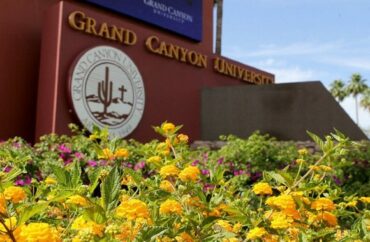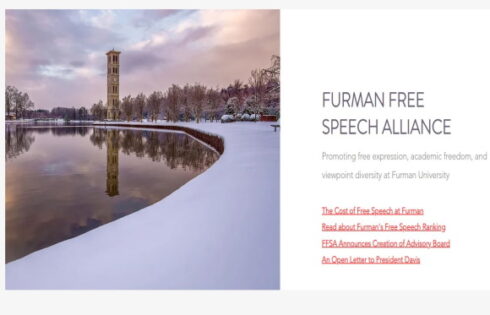
UPDATED
University leaders: Biden admin ‘weaponizing’ government against Christians
Grand Canyon University leaders accused the Biden administration of singling out their institution for its Christian beliefs after the federal government filed a second lawsuit against the school in late December.
The Dec. 27 complaint from the Federal Trade Commission alleges the private university in Arizona, its for-profit marketing arm Grand Canyon Education, and University President Brian Mueller engaged in deceptive advertising, “abusive telemarketing practices,” and other violations.
Mueller said in a statement provided to The College Fix that the FTC and, in a separate case, the U.S. Department of Education, have unfairly targeted Grand Canyon University under the Biden administration. He said GCU has a “stellar” reputation, record enrollment numbers, and 15-year tuition freeze.
“Rather than applaud those efforts or try to understand why students are choosing GCU in record numbers, these federal government agencies seem more focused on an ideological agenda aimed at stopping a university that has used two cornerstones of American society – the free market system and a Christian worldview perspective – to become the largest Christian university in the country,” he said.
But FTC spokesperson Douglas Farrar told The Fix the lawsuit is based on findings from a “thorough investigation,” not religious discrimination.
“Our lawsuit was filed following a thorough investigation, and our allegations are based on the facts and the law,” Farrar told The Fix this week in an email. “To falsely state that the FTC’s lawsuit is based on religious or political discrimination is a disservice to the students harmed by the alleged deceptive and illegal practices pursued by Grand Canyon University and its president, Brian Mueller.”
In the case, the FTC alleged the university deceptively advertised itself as a nonprofit institution despite operating “for the profit of GCE and its investors,” which receive 60 percent of the university’s revenue.
The lawsuit cited the Department of Education’s November 2019 refusal to recognize GCU as a nonprofit for the purposes of federal funding.
MORE: Biden administration fines largest Christian university $37.7M
Mueller disputed these charges in his statement, saying GCU identified itself as a nonprofit for 18 months after receiving approval from the IRS, which was before the DOE’s determination.
Mueller said the FTC’s decision to raise the issue now – almost five years later – is the “height of absurdity.”
GCU also has been lawfully recognized as a nonprofit by the IRS, the state of Arizona, and the Higher Learning Commission, he said.
The FTC complaint also alleged that GCU deceptively marketed its accelerated doctoral programs by telling prospective students it requires 20 classes – when it actually requires almost all students to take more than that.
But Anthony Rotolo, a 2022 graduate of GCU with a doctorate in philosophy, told The Fix that these allegations “really bothered” him because they are not consistent with his experience.
He said the program was affordable and flexible, and GCU made it clear that achieving a doctorate in four years, as he did, was a very accelerated program.
Prior to GCU, Rotolo said he taught digital and social media courses as an assistant professor at Syracuse University in New York, so he knows academia.
He told The Fix that he wonders if GCU is being targeted because the university makes it easier for people of all backgrounds to earn a doctorate — and it’s disrupting the “elitist” higher education system.
“Folks at the education department are the same folks who have emerged from that system,” he said. “I think what GCU is doing is a positive thing for higher education in the U.S. … Alternatives are good, and disrupting the system is good.”
Other allegations in the FTC complaint alleged the university violated the Telemarketing Sales Rule by calling people who had requested not to be contacted or who were listed on the National Do Not Call Registry.
The FTC is committed “to protect consumers from alleged misrepresentations and illegal conduct related to education,” the federal agency said in a statement Dec. 28 about the case.
However, GCU leaders said the allegations are “frivolous,” and the federal government is making a coordinated effort to cause “harm” to the largest Christian university in the U.S.
“The FTC’s allegations related to GCU and GCE are unfortunately yet another example of the Biden Administration weaponizing federal government agencies in a coordinated effort to target institutions to which they are ideologically opposed,” the university said in a Dec. 27 statement.
Currently, the university also is embroiled in a separate legal battle with the Department of Education regarding its nonprofit status. The case is pending in the Ninth Circuit Court of Appeals.
Additionally, in October, the department fined GCU a record $37.7 million for allegedly misstating the cost of its doctoral programs, The Fix reported at the time. GCU denied the allegations and is appealing the fine.
“Given the major problems that exist in higher education[,] … it is baffling that the federal government has chosen to target a Christian university that is addressing those issues in very positive ways,” the university said in its response to the FTC allegations. “No other institution in higher education is facing this level of government scrutiny, which speaks volumes about these agencies’ motivations and agenda.”
Editor’s note: Updated with statements from Anthony Rotolo.
MORE: ‘Faithful Catholic colleges’ see enrollment boom
IMAGE: Grand Canyon University website
Like The College Fix on Facebook / Follow us on Twitter





Please join the conversation about our stories on Facebook, Twitter, Instagram, Reddit, MeWe, Rumble, Gab, Minds and Gettr.